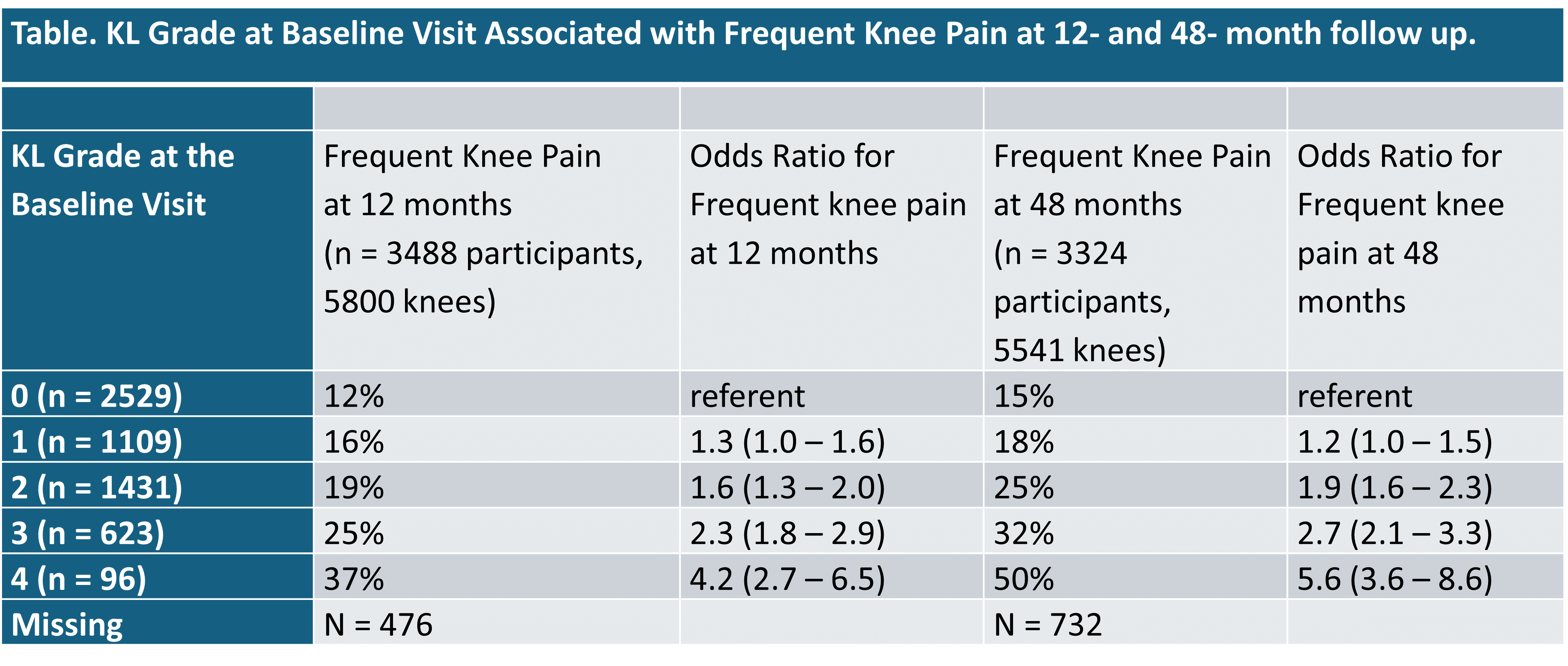Session Information
Session Type: Poster Session C
Session Time: 10:30AM-12:30PM
Background/Purpose: Osteoarthritis (OA) is the most common form of arthritis, a condition associated with substantial disability. Radiographic severity of OA is associated with the presence or absence of frequent knee pain cross-sectionally. Our purpose was to test the prognostic potential of radiographs among knees without frequent pain by evaluating whether radiographic disease severity predicts frequent knee pain over time.
Methods: This is a knee-based longitudinal study of participants of the Osteoarthritis Initiative (OAI). We only included knees that were free of frequent pain at the baseline visit. Posterior-Anterior semi-flexed knee radiographs were obtained at the baseline visit and scored for Kellgren-Lawrence (KL) grade (0-4). At the baseline and annual visits, participants reported whether they had knee-specific frequent pain using the question, of whether the participant has had had (right/left) knee pain, aching or stiffness on more than half the days of a month in the last 12 months?We performed knee-based logistic regression analyses, using generalized estimating equations to account for correlation between knees within a person, where the independent variable was baseline KL grade and the outcome of interest was frequent knee pain at the 12-month visit. Analyses were repeated with outcome at the 48-month visit.
Results: 6159 knees from 3714 participants were included in this study, 58% were female, mean age was 61.5 (9.2) years, mean body mass index was 28.3 (4.7) m2/kg.
Conclusion: Radiographic disease severity, based on KL grades, is a prognostic biomarker for frequent knee pain among those without existing symptoms in as short as one year of follow-up. Radiographs could be a screening tool to identify those at high risk of developing frequent knee pain. This may be a useful strategy for testing potential therapies aimed at the preventing the onset of frequent knee pain.
Disclosures: G. Lo: None; J. Patarini: None; T. McAlindon: Anika, 2, Grunenthal, 2, Kiniksk, 2, Kolon TissueGene, Inc., 2, Medipost, 2, Novan, 2, Organogenesis, 2, Regeneron, 2, Remedium-Bio, 2, Samumed, 2, Sanofi, 2, Scarcell, 2, Visor, 2; C. Eaton: None; J. Driban: None.
To cite this abstract in AMA style:
Lo G, Patarini J, McAlindon T, Eaton C, Driban J. Don’t Throw Out X-Rays! Radiographic Osteoarthritis Severity is Prognostic for Onset of Frequent Knee Pain [abstract]. Arthritis Rheumatol. 2025; 77 (suppl 9). https://acrabstracts.org/abstract/dont-throw-out-x-rays-radiographic-osteoarthritis-severity-is-prognostic-for-onset-of-frequent-knee-pain/. Accessed .« Back to ACR Convergence 2025
ACR Meeting Abstracts - https://acrabstracts.org/abstract/dont-throw-out-x-rays-radiographic-osteoarthritis-severity-is-prognostic-for-onset-of-frequent-knee-pain/

